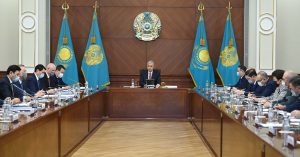Kazakhstan’s President Kassym-Jomart Tokayev said the heating crisis that left the northeastern town of Ekibastuz at -30 degrees Celsius for 10 days was the product of “irresponsible governance” and threatened to make an example of those who failed to coordinate the work of the power plant.
Tokayev’s words, spoken at a joint meeting of ministers and regional governors on December 12, were consistent with the president’s strong-arm attitude of 2022. Since the events of Bloody January, Tokayev has shown resolve in breaking with the “old regime” and replacing it with his so-called “New Kazakhstan.”
To do so, Tokayev has had to show confidence. He repeatedly talked about changes and new pathways, signaling that the time of defining him as “a product of the old regime” was now over.
His criticism of the three-decade rule of Nursultan Nazarbayev has continued steadily since January, with strong words regarding the “colossal concentration” of wealth in the hands of a few, powerful individuals.
At the recent government meeting, Tokayev tackled yet another issue: a lack of accountability. According to him, the government disregards key problems for too long, until they turn into crises.
“We are used to sweeping consumer complaints under the rug. This practice has led to massive consequences, which required enormous resources to be resolved. We need to learn the lesson, carry out an investigation into why this happened, and make appropriate decisions,” Tokayev said.
A report by Vlast.kz showed the dire conditions with which residents of Ekibastuz, a city of 150,000 people located 300 kilometers east of Astana, had to cope for more than a week, after a power plant failure during a cold snap that never saw temperatures go above -20 degrees Celsius.
Locals could only heat their apartments with electric stoves, and only when the city supplied electricity. Until the state of emergency was lifted on December 8, most homes only received electricity for a few hours every day. Little by little, housing complexes were reattached to the heating grid, as the problems at the Thermal Power Plant (TPP) were patched.
“I wake up from the cold every day at 6 a.m., because at 2 a.m. they cut off electricity,” one resident told Vlast.kz reporters last week.
Entire homes froze; pipes burst and their contents became blocks of ice. In some residential complexes, the sewage system stopped working and people had to use public restrooms or emergency buckets for days.
For a country rich with energy resources and a region filled with mining and processing plants, the Ekibastuz disaster is a reminder that when resources are mismanaged, a crisis is always around the corner.
In an interview, the director of the plant said that the problems at TPPs in Kazakhstan are systemic.
“Unfortunately, this year we saw a number of failures at heating networks and stations, in Taldykorgan, in Almaty. Now the question of the city of Aktau arose. TPPs in Ridder, Zhezkazgan, Ust-Kamenogorsk are under scrutiny. In my understanding, this is a systemic problem,” Bagdat Oral told Vlast.kz.
The Ekibastuz TPP is owned by Central Asian Electric Power Corporation (CAEPCO), a large corporation controlled by Aleksander Klebanov and Sergei Kan, two of Kazakhstan’s richest men. Media in Kazakhstan highlighted how their ties to more powerful business and political elites have allowed their company to thrive unchecked.
Now, the government is considering CAEPCO’s proposal to sell the Ekibastuz TPP to the state for the symbolic sum of 1 tenge.
On this matter, Tokayev said that the authorities will investigate what kind of responsibility the the owners of the plant should bear for the network failure.
“The proposal to sell the plant to the state for 1 tenge […] needs to be examined. It is necessary to find out whether the state can effectively manage such a worn-out facility,” Tokayev said.
That TPPs and the heating infrastructure in Kazakhstan are worn out is a well-known fact both in the government corridors and among the population. Preventive mechanisms are still not in place, despite Tokayev’s claim that the situation is gradually changing.
Hopes to witness a real change in Tokayev’s New Kazakhstan were further frustrated when he mentioned that he would fire government officials who cannot keep up with the task of modernizing Kazakhstan. Tokayev’s words echoed Nazarbayev’s “there are no untouchables” speech from 2015, and several of the Soviet-style dressing downs of the past that nonetheless yielded little to no change.
































